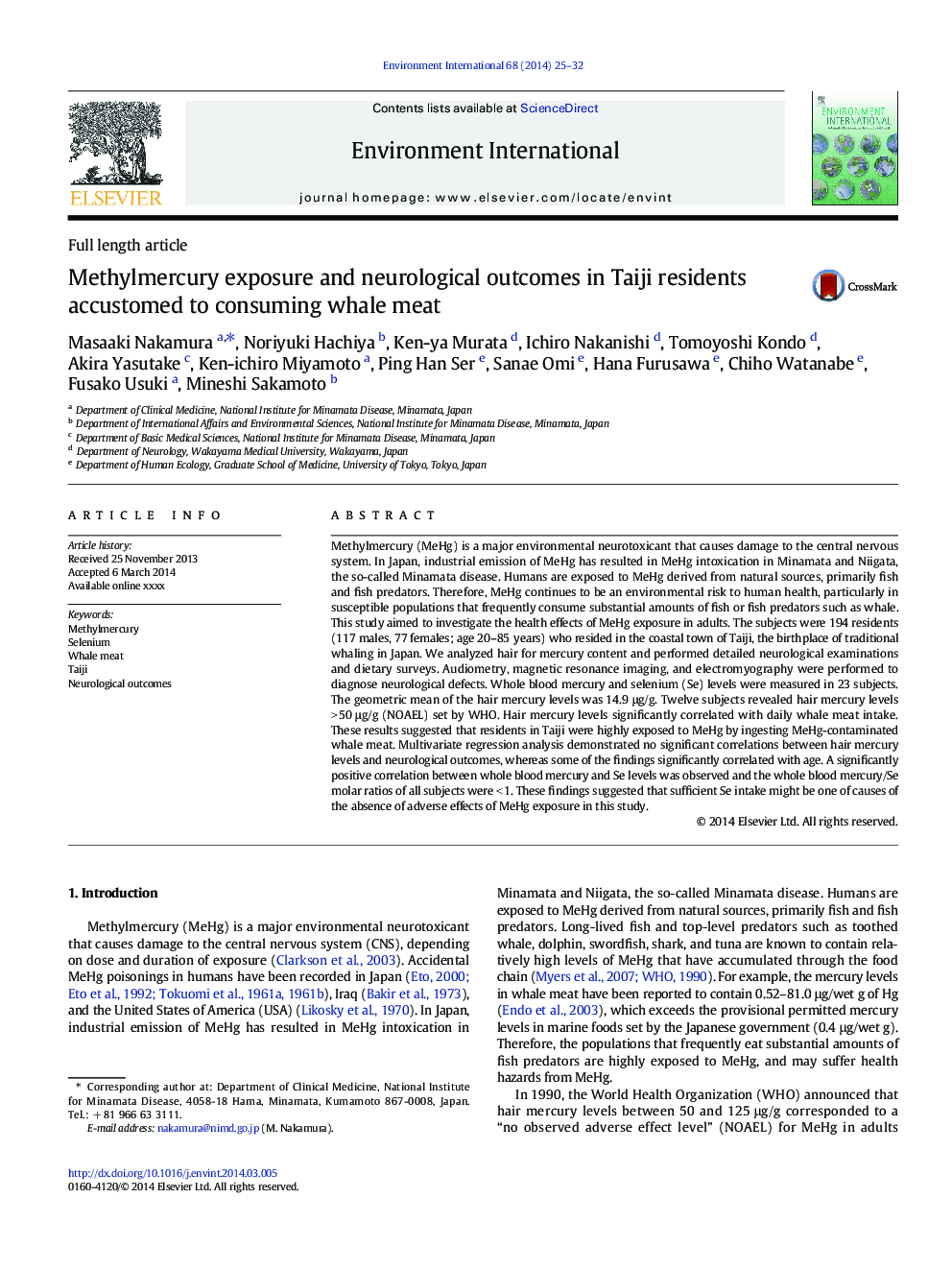| کد مقاله | کد نشریه | سال انتشار | مقاله انگلیسی | نسخه تمام متن |
|---|---|---|---|---|
| 6313998 | 1619060 | 2014 | 8 صفحه PDF | دانلود رایگان |
عنوان انگلیسی مقاله ISI
Methylmercury exposure and neurological outcomes in Taiji residents accustomed to consuming whale meat
ترجمه فارسی عنوان
قرار گرفتن در معرض متیل کرچک و پیامدهای عصبی در ساکنان تاجی که عادت به مصرف گوشت نهنگ دارند
دانلود مقاله + سفارش ترجمه
دانلود مقاله ISI انگلیسی
رایگان برای ایرانیان
کلمات کلیدی
متیل کرچک، سلنیوم، گوشت نهنگ، تایجی، پیامدهای عصبی،
موضوعات مرتبط
علوم زیستی و بیوفناوری
علوم محیط زیست
شیمی زیست محیطی
چکیده انگلیسی
Methylmercury (MeHg) is a major environmental neurotoxicant that causes damage to the central nervous system. In Japan, industrial emission of MeHg has resulted in MeHg intoxication in Minamata and Niigata, the so-called Minamata disease. Humans are exposed to MeHg derived from natural sources, primarily fish and fish predators. Therefore, MeHg continues to be an environmental risk to human health, particularly in susceptible populations that frequently consume substantial amounts of fish or fish predators such as whale. This study aimed to investigate the health effects of MeHg exposure in adults. The subjects were 194 residents (117 males, 77 females; age 20-85 years) who resided in the coastal town of Taiji, the birthplace of traditional whaling in Japan. We analyzed hair for mercury content and performed detailed neurological examinations and dietary surveys. Audiometry, magnetic resonance imaging, and electromyography were performed to diagnose neurological defects. Whole blood mercury and selenium (Se) levels were measured in 23 subjects. The geometric mean of the hair mercury levels was 14.9 μg/g. Twelve subjects revealed hair mercury levels > 50 μg/g (NOAEL) set by WHO. Hair mercury levels significantly correlated with daily whale meat intake. These results suggested that residents in Taiji were highly exposed to MeHg by ingesting MeHg-contaminated whale meat. Multivariate regression analysis demonstrated no significant correlations between hair mercury levels and neurological outcomes, whereas some of the findings significantly correlated with age. A significantly positive correlation between whole blood mercury and Se levels was observed and the whole blood mercury/Se molar ratios of all subjects were < 1. These findings suggested that sufficient Se intake might be one of causes of the absence of adverse effects of MeHg exposure in this study.
ناشر
Database: Elsevier - ScienceDirect (ساینس دایرکت)
Journal: Environment International - Volume 68, July 2014, Pages 25-32
Journal: Environment International - Volume 68, July 2014, Pages 25-32
نویسندگان
Masaaki Nakamura, Noriyuki Hachiya, Ken-ya Murata, Ichiro Nakanishi, Tomoyoshi Kondo, Akira Yasutake, Ken-ichiro Miyamoto, Ping Han Ser, Sanae Omi, Hana Furusawa, Chiho Watanabe, Fusako Usuki, Mineshi Sakamoto,
